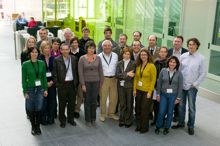2010 Press Releases
08.10.2010
A consortium of researchers from across Europe (Spain, France, Italy and UK) gathered at Tyndall National Institute, UCC earlier this week.
The meeting was held as part of a European project BOND (Bioelectronic Olfactory Neuron Device) to discuss progress made on the development of an electronic nose.
At the heart of this exciting project is an electronic nanobioplatform that can mimic the mammalian olfactory system by tiny bioelectronic sensors. “Several hundred different nanobio sensors are needed to create an artificial olfaction system capable of detecting almost any smell and nanotechnology makes this task feasible”, according to project coordinator Professor Josep Samitier from University of Barcelona. This innovative electronic olfactory system is based on the convergence of advanced micro/nano, bio and information technologies to achieve the required selectivity and sensitivity. The new interdisciplinary technology approach, which is being developed and tested by the researchers with funding from the European Commission’s 7th Framework Programme, will ultimately lead to electronic noses based on natural olfactory receptors that could be used not only in healthcare but also in agriculture, food, environmental protection or security.
One important application area of this technology is the potential for early stage diagnosis of aggressive diseases such as prostate and bladder cancers. There is evidence that specially trained sniffer dogs can detect cancer with their sense of smell. In a similar way, the BOND electronic nanobioplatform could provide an early stage disease detection capability by replicating this smell technology.
The key component of this platform is a nanocell known as a nanotransducer. Tyndall, a world leader in this technology, has completed the design and just began fabrication of the first nanotransducer for the project. This was made possible through Tyndall’s new state-of-art fabrication, packaging, integration t and characterisation facilities that were opened in 2009.
“A number of young researchers and postgraduate students are involved in this project. It is providing invaluable training for them in the area of nanobiotechnology, an area that has grown exponentially in recent years. They are being led by world-recognised Irish scientists and academics. Participation in such projects helps propel Ireland to the forefront of nanobiotechnology, key innovative technology capable of creating new positions and boosting Irish smart economy” said Dr Vladimir Ogurtsov Tyndall PI coordinating development of smart nanotransducers in this project.
Visit: http://bondproject.org/
P icture: European project partners from Spain, France, Italy, UK and Ireland pictured at Tyndall National Institute, UCC during their workshop on the development of an electronic nose
MMcS

